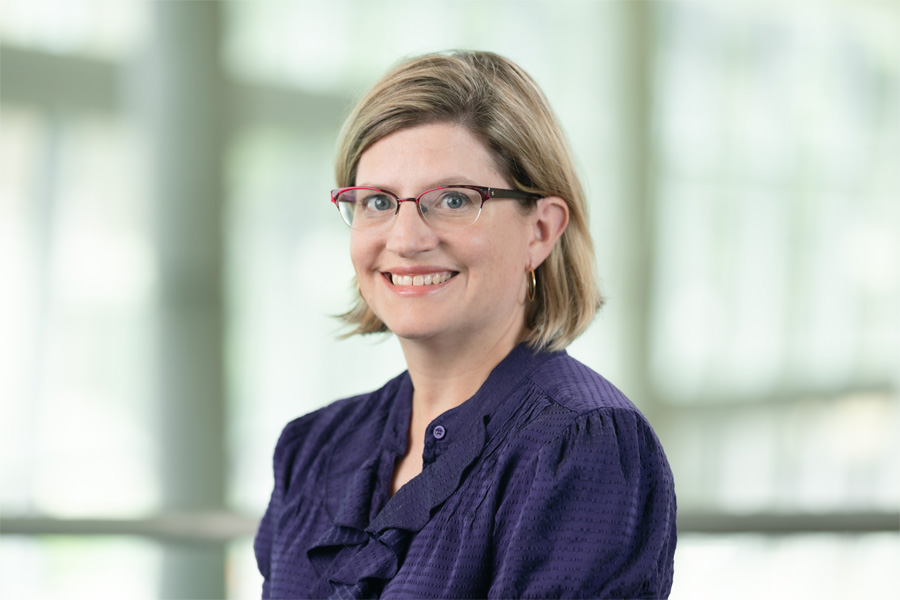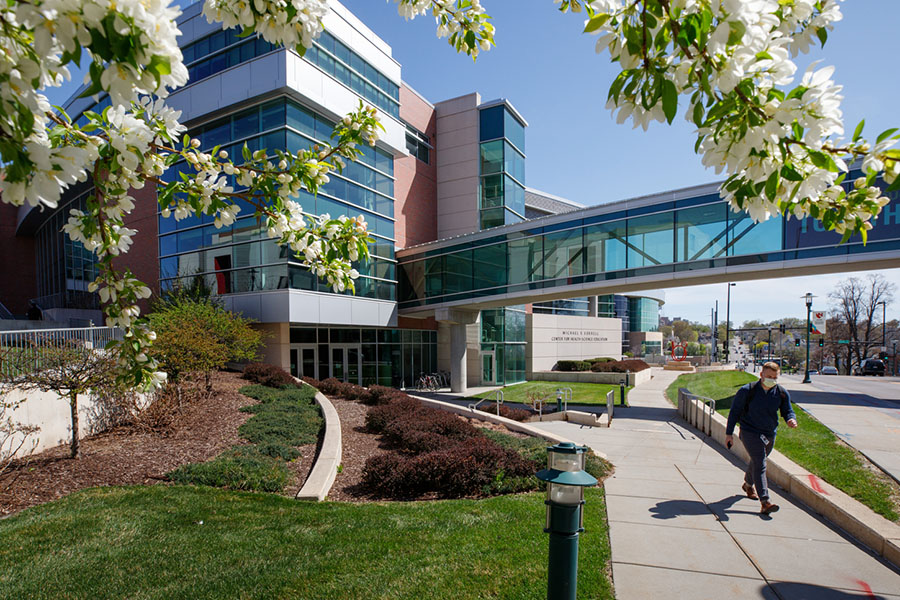PhD Program FAQs
General PhD Program Questions
Admissions and Getting Started
The coordinators of the Biochemistry and Molecular Biology Graduate Program are Dr. Rebecca Deegan, chairperson of the Biochemistry and Molecular Biology Graduate Committee; Ms. Karen Hankins, education associate, and Mr. Terry Qualls, HR/education associate. Dr. Deegan will assist you with setting up your rotations and explaining the courses of study; Mr. Qualls and Ms. Hankins will assist with filling out forms and will direct you through the enrollment process and registration for classes. They will also help you with questions about student health and insurance, fees and housing. The UNMC Graduate Student Association and Office of Graduate Studies sponsor new graduate student orientation during the week before classes begin.
Contact Information:
Rebecca Oberley-Deegan, PhD
985870 Nebraska Medical Center, zip 5870
402-559-9364
becky.deegan@unmc.edu
Terry Qualls
7005 DRC 1, zip 5870
402-559-1961
tqualls@unmc.edu
Karen Hankins
7005A DRC, zip 5870
402-559-4417
karen.hankins@unmc.edu
Terry Qualls coordinates the activities of newly arrived international students. He will assign another Biochemistry and Molecular Biology student as a guide to assist with pick-up at the airport, lodging and initial orientation to the UNMC campus and Omaha area. The guides will also walk new students around the UNMC campus to file forms, turn in documents, purchase supplies and books, etc. one of the most important and immediate needs is to apply for a Social Security number. Questions pertaining to visa status or USCIS paperwork should be addressed to Dan Teet, International Student Advisor, in the Graduate Studies Office.
Contact Information:
Dan Teet
Graduate Studies Associate, International Student Advisor
2.0.108 Williams Science Hall, zip 5700
402-559-8326
dteet@unmc.edu
What to Expect in the First Year
As noted, rotations are a critical time that allow the student to explore his/her research interests without having yet committed to a laboratory. Rotations also allow the student to assess how well he/she will get along with a potential future mentor and colleagues in the laboratory. At the same time, this is also a period of evaluation that allows the mentor to judge how well the student would fit into his/her laboratory. Mentors are individuals and many have slightly different expectations from rotation students.
Although mentors are well aware of the coursework, and expect the students to dedicate sufficient time to obtain good grades in the course work, mentors will also be interested in finding out whether prospective students are committed to their research projects, whether they are responsible and ethical in their approach to science and laboratory work, and whether they show intellectual curiosity and enthusiasm. Students who are unsure of their performance in rotations should be encouraged to ask the mentors how they are doing so that they can improve during the course of the rotation and in subsequent rotations.
Research Rotations and Choosing an Advisor
Your decision for final lab should be made by the end of your third rotation. You should talk with all faculty members with whom you rotated. Once you have made your decisions, you should talk with Dr. Deegan. Final decisions should be approved by the faculty member whose lab you wish to join, Dr. Deegan and Dr. Batra.
Supervisory Committees
Your choice of adviser does not become official until the Dean of Graduate Studies has been notified in writing as to the graduate faculty members who have agreed to serve on your supervisory committee. It is the responsibility of each graduate student, in consultation with her/his adviser, to select the faculty members to serve on the committee and to make sure that all potential members have agreed to serve. Once that is done, inform Ms. Hankins and she will complete the necessary forms and submit them to the Graduate Studies Office.
Until you have done that and received approval of your committee appointments from the Dean of Graduate Studies, the Biochemistry and Molecular Biology Graduate Committee is your official adviser and the chairman of that committee must sign your registration forms and other important documents.
The first and foremost suggestion is NOT to assume that, other than your supervisor, your committee members will remember exactly what you told them at the previous committee meeting. As you progress through your graduate career and have more meetings, the committee will become more familiar with your work and get to know you. But it is up to you to make sure the committee members are updated about your work. So here's the best way to prepare for an upcoming meeting:
- Several weeks in advance of the meeting, email or call the members of your committee to arrange a time and date for the meeting.
- Work with Ms. Hankins to schedule a room for the meeting.
- Update your research description (the five-page document you use for graduate assistantship and fellowship applications is ideal for this purpose).
- Distribute the updated research description and any accessory documents to the committee members as an email attachment (preferably) or hard copy several days before the meeting.
- The accessory documents that you are hoping the committee will discuss or consider at your meeting may include future research plans, special requests for modification of your Program of Study, outline of your dissertation, etc.
- Prepare a PowerPoint presentation on your new work, providing sufficient background information and key pieces of older data to provide orientation to the research in progress.
Vacation and Attendance Policies
The policy includes the following:
- Your mentor must give approval prior to your vacation.
- Written notice via e-mail and by filling out an Absence Report Form (these are located in the Biochemistry and Molecular Biology office) MUST be given to the graduate program office associate (Karen Hankins).
- All coursework must be dealt with by student; please inform appropriate course coordinators of your absence in their courses so you may be excused and also find out what you will be missing from classes.
- If you are gone from classes because of illness, please notify your mentor and the graduate program office associate of your absence via e-mail or telephone by noon on the day you are ill.
- Journal Club and Seminar attendance policies apply to all absences - see below.
Attendance at both departmental seminars and journal club is required of all Biochemistry and Molecular Biology students. Required seminars also include doctoral dissertation and master's thesis defenses as well as presentations by candidates for faculty positions. Each student will be permitted two excused absences per semester for journal club and seminar combined. For purposes of this course, excused absences are defined as: attendance at an off-campus scientific meeting, recruitment trips and illness.
Please note that "having an important experiment running" is NOT a valid excuse for missing journal club/seminar. It is expected that you will organize your schedule to ensure that you are available to attend journal club and seminar just as you would for any other required course. If you know that you will be unable to attend journal club or seminar for a valid personal or professional reason, then contact the course coordinator and the departmental office prior to the journal club or seminar in question.
Review Additional Topics

Rebecca Oberley-Deegan, PhD
Professor, UNMC Department of Biochemistry and Molecular Biology
Vice Chair for Education
Biochemistry Graduate Committee Chair
Full member, Fred & Pamela Buffett Cancer Center

